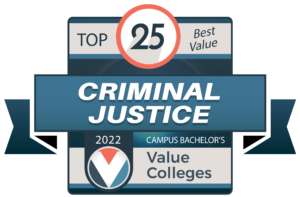25 Top Criminal Justice Colleges for Bachelor’s Degree in 2022

Find your perfect value college

The Criminal Justice field is home to many of those perennial career options – the jobs that are always needed, everywhere, and that will always provide job security, if not fabulous wealth. Careers like law enforcement, corrections, parole, and legal clerks have a long history, and will never be replaced by machines or outsourced. Other criminal justice field careers, such as cybersecurity and border patrol, are relatively new or gaining in prominence in recent years, and appear to not only be here for the long haul, but growing for the foreseeable future.
Criminal Justice degrees are largely interdisciplinary by necessity, as a full understanding of the justice system requires not only knowledge about government and law, but also of technology and human behavior (which includes sociology, psychology, biology, neuroscience, and more). With the rise in demand, many new criminal justice schools are being established alongside the old guard. Some of these newer criminal justice schools are led by reputable experts, practitioners, and scholars from all sides of the criminal justice degree field; others are thrown together to capitalize on criminal justice students’ needs and aren’t really worth your investment.
Featured Programs
Methodology: How We Ranked the Best Undergraduate Criminal Justice School Programs
To rank the best criminal justice colleges for criminal justice majors, Value Colleges editors considered accredited criminal justice schools that are primarily or exclusively on-campus, ranking them according to our Best Value formula: tuition cost, potential salary, and job market reputation. Data comes from IPEDS and Niche.
1. University of Pennsylvania

The University of Pennsylvania’s Department of Criminology offers the nation’s only Ivy league and best undergraduate criminology degrees in the country. Core classes for the University of Pennsylvania’s best criminal justice degrees include an introduction to criminology, race and ethnic relations, criminal justice, and a research capstone (completed in the student’s senior year), to name a few. Classes for this bachelor’s level degree from the University of Pennsylvania include an introduction to criminology, special topics in the criminal justice field, plus a research capstone in the student’s final year, among others.
Founded by Benjamin Franklin in the 1750s, the University of Pennsylvania is recognized to be among the oldest universities in the country and a colonial college. The University of Pennsylvania’s student enrollment exceeds 22,350 students each year, vying for degrees offered by sixteen colleges/schools. Penn’s distinguished alumni include Supreme Court Justices, Governors, and Senators, among others.
Criminal Justice Degrees:
Major in Criminology
2. University of Florida

The University of Florida offers a BA in Criminology that ranks among the best undergraduate criminology degrees in the Sunshine State. Criminal Justice students enrolled in UF’s undergraduate criminal justice degree, are required to complete a minimum of 120-semester credits. Coursework for the University of Florida’s undergraduate degree in criminal justice includes advanced principles of criminal justice, plus electives that include crime and punishment in American History, US Legal History, or Law and Economics, to name a few.
The University of Florida was founded in the 1850s as a land-grant school. In addition, the University of Florida operates as a sea and space grant institution of higher education with a student enrollment that exceeds 56,500 undergraduate and graduate students. The University of Florida student-athletes have won more than 100 Olympic Medals.
Criminal Justice Degrees:
BA in Criminology
3. University of Maryland-College Park

The University of Maryland offers a BA in Criminology & Criminal Justice that is one of the most innovative and best undergraduate criminology degrees in Maryland and beyond. Classes for UMD’s best undergraduate criminal justice programs include crime and delinquency prevention, statistics for criminology & criminal justice, criminal justice research methods, and courts and sentencing, to name a few. This criminal justice major requires the completion of 39 credit units from the CCJS curriculum.
The University of Maryland’s College Park location is the flagship campus of the state’s university system that was established as an agricultural school in the mid-1850s. Additionally, this space-grant university serves more than 41,500 students from its campus, making it the largest comprehensive institution of higher learning in the greater Washington, DC area. UMD is considered a Public Ivy school.
Criminal Justice Degrees:
BA in Criminology and Criminal Justice
4. University of California, Irvine

The University of California, Irvine’s Department of Criminology offers a Bachelor of Science degree program (BS) in Criminology & Law & Society that focuses on how crime interacts with the law, social, cultural, and political forces. As one of Golden State’s best undergraduate criminology programs, UC Irvine’s degree requires the completion of 180 quarter credits, which is generally finished in three or four- year course sequences. Students enrolled in UC’s best undergraduate criminal justice programs complete classes in the foundations of criminology, law, and society, American Law, theories of punishment, domestic violence, and US legal thought, to name a few.
The University of California, Irvine was founded under the Morrill Act as a land-grant research school in 1965. The university is one of the ten-member schools of the state’s university system, with a student enrollment of more than 35,150 students. The Irvine campus of UC is recognized to be one of the nation’s Public Ivies.
Criminal Justice Degrees:
BS in Criminology, Law, and Society
5. Rutgers, The State University of New Jersey

Rutgers University offers a BA in Criminal Justice that is among New Jersey’s best undergraduate criminal justice programs. Classes for Rutgers University’s best undergraduate criminology programs include criminal law – theory & practice, prisons & prisoners, crime & public policy, crimes against humanity, forensic science, and ideas in justice, to name a few. Students are encouraged to tailor or customize their criminal justice academic program.
Rutgers University is one of the oldest schools in the country, established in the 1760s as Queen’s College, the second oldest in the Garden State, only Princeton is older. Rutgers is also a sea, space, and land-grant school that serves nearly 69,000 students online and on the three primary campuses in New Jersey. Rutgers holds the distinction of being the largest higher learning institution in New Jersey.
Criminal Justice Degrees:
BA in Criminal Justice
6. University of Delaware

The University of Delaware’s Department of Social and Criminal Justice offers a Bachelor of Arts degree program (BA) in Criminal Justice that is recognized to be one of the east coast’s best undergraduate criminal justice programs. An integral part of UD’s best undergraduate criminology programs is the required field experience or practicum that integrates theory & knowledge with practical experience. Classes for this undergraduate degree in criminal justice include problems of law enforcement, introduction to criminal justice, corrections, and criminal judiciary, to name a few.
The University of Delaware is the largest school in the state that was established under the Morrill Land Grant Act in the 1830s. UDel maintains a main campus in Newark as well as satellite facilities in Lewes, Georgetown, Dover, and Wilmington that serve about 24,100 students each year. The University of Delaware is one of only four higher learning institutions that offer an art conservation major.
Criminal Justice Degrees:
BA in Criminal Justice
7. University of Iowa

The University of Iowa’s (IA) College of Liberal Arts/Sciences offers two of Iowa’s best undergraduate criminology programs with its Bachelor of Arts or Bachelor of Science in Criminology, Law & Justice. These best undergraduate criminal justice programs have slightly different requirements but include coursework in criminology, sociological theory, research methods in criminology, plus a capstone or internship in criminal justice, to name a few. Additionally, interested criminal justice students can opt for one of the school’s double major options in business analytics or finance.
The University of Iowa was established in the 1840s and now operates as a space-grant school. The University of Iowa’s campus is situated along the Iowa River and serves about 33,000 students each year. The University of Iowa holds the distinction of being the 2nd-largest and oldest institution of higher education in the state.
Criminal Justice Degrees:
BA or BS in Criminology, Law, and Justice
8. Michigan State University

Michigan State University offers a BA in Criminal Justice that is recognized as one of the most innovative and best undergraduate criminology programs in Michigan. Classes for MSU’s best undergraduate criminal justice degree include criminal procedure, methods of criminal justice research, race & justice, private security, advanced topics in cybersecurity, criminology & public policy, crime, mass media and society, and juvenile justice, plus an independent study, to name a few.
Founded in the 1850s as a land-grant school, Michigan State University also operates as a space and sea-grant school that serves approximately 50,000 postgraduate and undergraduate students from its East Lansing campus and online platform. Michigan State University’s athletes play as the Spartans and have won multiple Rose Bowls and national championships in football.
Criminal Justice Degrees:
BA in Criminal Justice
9. University of Texas at Dallas

The University of Texas at Dallas offers a BA in Criminology that is among the Lone Star State’s most innovative and best undergraduate criminology degrees for criminal justice students. The University of Texas’s best undergraduate criminal justice programs offer a fast-track option for criminal justice students to take master’s level coursework during their bachelor’s degree coursework. This undergraduate degree in criminal justice from UT Dallas requires degree candidates to complete a minimum of 120-semester units to meet degree requirements.
The University of Texas at Dallas was established in the early 1960s as a research center for Texas Instruments. This member school of the state university system is the largest in the greater Dallas area and the most northern campus of the system. More than 29,150 students attend classes each year. The University of Texas at Dallas is recognized by Kiplinger as a best-value school.
Criminal Justice Degrees:
BA in Criminology
10. Indiana University Bloomington

Indiana University Bloomington offers a BA in Criminal Justice that is among Indiana’s best undergraduate criminal justice degrees. Indiana University’s best undergraduate criminology programs offer degree candidates academic tracks in criminal justice & psychology, criminal justice, and the law, and gender, race, and crime. Upper-level coursework for this Indiana University Bloomington degree includes private security, prosecution, white-collar crime, adolescents and the law, cybercrime, and digital evidence, to name a few.
Founded as a research school in 1820, Indiana University Bloomington now operates as the flagship and largest campus in the state, with nearly 44,000 students each year. More than half the students at Indiana University Bloomington are from the state of Indiana. Highlight -the school’s campus covers nearly 2,000 acres and is home to a number of historic buildings.
Criminal Justice Degrees:
BA in Criminal Justice
11. University of Illinois at Chicago

The University of Illinois at Chicago offers a BA in Criminology, Law & Justice that is among the Windy City’s most innovative and best undergraduate criminal justice degrees. The University of Illinois at Chicago’s best undergraduate criminology programs require students to take classes in law and society, criminology, intro to criminology, law, and justice, principles of criminal law, and research methods, to name a few, for a total of 120 bachelor’s level credit units.
The University of Illinois at Chicago is a research institution of higher education that operates two campuses in the Windy City. With approximately 33,150 students, UIC is the largest school in the greater Chicago area vying for degrees offered by the University of Illinois at Chicago’s sixteen colleges/schools. The University of Illinois at Chicago is recognized to be both a Hispanic-serving and Asian-serving research school.
Criminal Justice Degrees:
BA in Criminology, Law, and Justice
12. University of South Florida

The University of South Florida offers a BA in Criminology that is considered among Florida’s best undergraduate criminology programs. The University of South Florida’s best undergraduate criminal justice degree requires students to finish a minimum of 120-semester credits at the baccalaureate level. Core coursework for the University of South Florida’s undergraduate degree in criminal justice includes research methods in criminal justice, theories of criminal behavior, and a survey of the criminal justice system, to name a few.
The University of South Florida operates as a multi-campus institution of higher education that was founded in the 1950s. The university’s campuses in St. Petersburg, Sarasota, and Tamp serve approximately 50,550 students each year. The University of South Florida is recognized to be the tenth biggest public institution of higher learning that is organized into 12 schools/colleges.
Criminal Justice Program:
BA in Criminology
13. California State University, Long Beach

California State University, Long Beach’s School of Criminology, Criminal Justice and Emergency Management offers a Bachelor of Science degree program (BS) in Criminology & Criminal Justice that is recognized as one of California’s most innovative and best undergraduate criminology degrees. CSU Long Beach’s best undergraduate criminal justice degree includes classes in criminal courts & judicial process, crime and inequality, comparative criminal justice and transnational crimes, substantive criminal law, and constitutional criminal procedure, to name a few.
California State University, Long Beach is a public institution of higher education that is also one of the 23 member schools of California’s state university system. California State University at Long Beach is the second-largest campus with a student enrollment that exceeds 33,950 students each year. California State University, Long Beach has the largest graduate student enrollment of any CSU member campus.
Criminal Justice Program:
BS in Criminology & Criminal Justice
14. Northeastern University

Northeastern University’s School of Criminology &. Criminal Justice offers a Bachelor of Science degree (BS) in Criminology & Law & Society Criminal Justice that is one of New England’s best undergraduate criminology programs. Northeastern University’s best undergraduate criminal justice degree includes classes in criminal due process, human trafficking, corruption, youth crime, and justice, policing a democratic society, integrity and accountability, global criminality, psychology crime, white-collar/corporate crime, the death penalty, and introduction to criminal justice, to name a few.
Northeastern University is a multi-campus institution of higher learning that was founded in the late 1890s. More than 27,550 undergraduate and graduate students online and on the school’s campuses in Boston, Charlotte, Seattle, San Jose, San Francisco, Portland, Toronto, and Vancouver. Northeastern is well known for its innovative cooperative education program that allows students to study while working and earning.
Criminal Justice Program:
BS in Criminal Justice
15. CUNY John Jay College of Criminal Justice

The CUNY John Jay College of Criminal Justice (JJCCJ) offers two of New York’s best undergraduate criminology programs with its BA in Criminal Justice (Criminal Control & Prevention) or its BA in Criminology. Each of CUNY’s best undergraduate criminal justice programs required degree candidates to complete a minimum of 120-semester units to meet CUNY graduation requirements. Classes for these criminal justice degrees include theories of social order, princes and methods of statistics, and selected topics in criminology, to name a few.
John Jay College of Criminal Justice (JJCJ) was established in the 1960s and is now a senior school within the City of New York’s university system. The college was established as the only liberal arts school with an academic focus on criminal justice & forensics. John Jay College of Criminal Justice’s urban campuses and online platform serve approximately 15,000 students.
Criminal Justice Program:
BA in Criminal Justice, BA in Criminology
school website
16. George Mason University

George Mason University’s offers a BS in Criminology, Law & Society that is one of Virginia’s best undergraduate criminology programs. George Mason University’s best undergraduate criminal justice programs require degree candidates to finish at least 120 bachelor’s credit units. Classes for George Mason University’s criminal justice undergraduate program include criminal justice ethics, constitutional law – criminal process & rights, introduction to criminal justice, plus a capstone in criminology, law, and society, to name a few.
George Mason University (Mason) was established in 1949 as a northern branch of the state’s university but became independent in the early 1970s. George Mason University, as a sea-grant school, maintains multiple campuses throughout the Commonwealth of Virginia. George Mason University also operates a campus in South Korea.
Criminal Justice Program:
BS in Criminology, Law, and Society
17. Washington State University

Washington State University’s BA in Criminal Justice is one of Washington state’s best undergraduate criminology programs. Classes for Washington State University’s best undergraduate criminal justice programs include administration of criminal justice, introduction to criminological theory, criminal justice management, policing in America, violence towards women, comparative criminal justice systems, crime control policies, and juvenile justice and corrections, to name a few.
Washington State University (Wazzu) is a public university that was established as a land-grant school in 1890 under the Morrill Land Grant Act. Washington State University’s student enrollment exceeds 30,550 undergraduate and graduate students each year. Washington State University maintains campuses in Vancouver, Spokane, Pullman, and the Tri-Cities and is recognized to be the second-largest institution of higher education in Washington State.
Criminal Justice Program:
BA in Criminal Justice
18. West Virginia University

West Virginia University offers a Bachelor of Applied Science in Criminal Justice that ranks among West Virginia’s most innovative & best undergraduate criminal justice programs. Applicants for West Virginia University’s best undergraduate criminology programs must hold an AAS (Associate of Applied Science) degree to be eligible for this 69 academic credit program. Classes for this completion degree include criminal evidence, research methods in criminal justice, victimology, statistics, ethics, and the criminal justice system, plus a senior capstone project.
West Virginia University (West Virginia) was established in 1867 under the Morrill Act as a land-grant school. The university also operates as a space-grant school with a student enrollment that nears 30,000 students across the school’s multiple campuses in Morgantown, Keyser, and Beckley. West Virginia University offers academic extension programs across the state’s fifty-five counties.
Criminal Justice Program:
BAS in Criminal Justice
19. San Diego State University

San Diego State University offers a BS in Criminal Justice that can be completed online or on-campus. San Diego State University’s best undergraduate criminal justice programs prepare students for careers in law enforcement, loss prevention, city administration, probation, or the county sheriff’s office. Classes for SDSU’s best undergraduate criminology programs complete classes in law & society, systems of justice, criminal justice policy & planning, criminal behavior, and juvenile justice, to name a few. The criminal justice degree offers tracks in crime & behavior, criminal justice systems, or law in society.
San Diego State University is a public higher learning institution that was established in 1897 as a normal school. SDSU is the 3rd oldest school in the California State University system and the southernmost campus. Highlight -More than 35,550 students attend classes online on the school’s 275+ acre urban campus in San Diego.
Criminal Justice Program:
BS in Criminal Justice
20. Pennsylvania State University

Pennsylvania State University’s Department of Sociology & Criminology offers two of Pennsylvania’s best undergraduate criminology programs with its Bachelor of Arts degree or its Bachelor of Science degree program in Criminology. Each of PSU’s best undergraduate criminal justice programs requires degree candidates to complete 121-semester credits, although some requirements differ between programs. Students graduate from Pennsylvania State University’s criminal justice degree programs to find rewarding careers in law enforcement, government, or corrections & rehabilitation, to name a few.
Founded as a farmer’s high school in the mid-1850s, Pennsylvania State University now operates as a land, sea, sun, and space-grant school with a student enrollment that nears 90,000 across all campuses. Pennsylvania State University is considered one of the Public Ivies, with two law schools.
Criminal Justice Program:
BA or BS in Criminology
21. Florida International University

Florida International University’s Green School of International and Public Affairs offers a Bachelor of Science degree program (BS) in Criminal Justice (BSCJ) that can be completed online or on-campus. Florida International University’s best undergraduate criminology programs require applicants to hold an associate degree. Classes for Florida International University’s best undergraduate criminal justice programs include criminological theory, criminal justice, and the constitution, introduction to criminal justice, plus a senior capstone project, to name a few.
Florida International University (FIU) was established in the mid-1960s and is now the largest institution of higher learning in South Florida. More than 58,550 students attend classes from this member school of Florida’s state system. Florida International University maintains six libraries across its campuses that serve appropriate schools.
Criminal Justice Program:
BS in Criminal Justice
22. Temple University

Temple University offers a BA in Criminal Justice that is one of Philadelphia’s most innovative and best undergraduate criminology programs. Students enrolled in Temple University’s best undergraduate criminal justice programs are required to complete at least 123 bachelor’s level semester credits. Core classes for Temple University’s criminal justice major include nature of the crime, criminal justice research methods, criminal justice statistics, and, plus, a capstone project, to name a few.
Temple University was established by a Baptist minister/Yale-educated attorney in 1884. The university’s urban campuses in the City of Brotherly Love and online platform serve nearly 40,000 students each year. Highlight -Temple operates six campuses, an introduction to criminal law, most of which are in Pennsylvania, and international facilities in Rome and Japan.
Criminal Justice Program:
BA in Criminal Justice
23. University of South Carolina

The University of South Carolina offers a BA in Criminology & Criminal Justice that ranks as one of the nation’s 25 best undergraduate criminology programs. The University of South Carolina’s best undergraduate criminal justice programs prepares graduates for careers in law enforcement, crime scene investigation, evidence collection, the prison system, and security, among others. Classes for this undergraduate degree in criminal justice include criminal procedure, policing, corrections, criminal courts, and sociology of crime, among others.
The University of South Carolina is a public institution that was established in 1801. U of SC maintains multiple campuses throughout South Carolina, with the main campus in the state’s capital. More than 52,000 students attend classes system-wide. The University of South Carolina is the state’s flagship school that is also a space-grant higher learning institution.
Criminal Justice Program:
BA in Criminology and Criminal Justice
24. University at Albany (SUNY)

The University at Albany’s (SUNY Albany) Criminal Justice School offers a Bachelor of Arts degree program (BA) in Criminal Justice that ranks among the most innovative and best undergraduate criminology programs in the Empire State of New York. The University at Albany’s best undergraduate criminal justice programs requires core classes in criminology, introduction to law & criminal justice, and introduction to statistics in criminal justice, plus one of three research methods coursework, to name a few.
The State University of New York @ Albany (Albany) was founded in 1844 as a state-funded normal school. The University at Albany maintains multiple campuses in New York’s capital region that serve approximately 18,000 students each year. The University at Albany is organized into nine colleges/schools that offer more than 175 programs, including emerging fields of homeland security, informatics, and biotechnology, among others.
Criminal Justice Program:
BA in Criminal Justice
school website
25. University of Southern Mississippi

The University of Southern Mississippi’s School of Criminal Justice, Forensic Science & Security offers a Bachelor of Arts degree program (BA) in Criminal Justice that is one of Mississippi’s best undergraduate criminology programs. USM’s best undergraduate criminal justice programs are available on the Hattiesburg or Gulf Park Campuses. The Hattiesburg campus offers a juvenile justice academic track for the BA in criminal justice program. Internships are potentially available in law enforcement agencies, the FBI, or the state prosecutor’s offices, among others.
The University of Southern Mississippi chartered in 1910 as a teacher’s training school, called the Mississippi Normal College, now operates as a public research academic facility. The University of Southern Mississippi operates campuses as a sea and space-grant school that serve nearly 15,000 undergraduate and postgraduate students each year. In addition to its two main campuses, the University of Southern Mississippi maintains five other academic facilities including a research lab and space center.
Criminal Justice Program:
BA in Criminal Justice
Why Should I Choose a Criminal Justice Major?
There are many reasons to choose a criminal justice Bachelor’s degree on campus. The first and best reason to choose this type of degree is simply because you enjoy this type of work. The next reason is that it will help to bolster your career and give you the skills you will need to be successful. Individuals who consider themselves problem-solvers often do well when it comes to criminal justice. They like to be able to find clues and figure out how they work together. If you are looking for a career in which you can work with others who have the same goals., criminal justice school may be a good fit. When you go to a criminal justice school, you can explore many different specializations. Forensic science and investigation skills are just two of the most common criminal justice focuses available.
Criminal justice brings together two of the most interesting career fields and gives students an opportunity to find out how seamlessly the two can become intertwined. If you already have a law enforcement background, this type of degree allows you to investigate the judicial or legal side of things. If you work in the legal field, you can learn more about the investigative processes and forensic science that law enforcement officers use to solve crimes and put a halt to various types of criminal activity. You will learn how new laws affect how law enforcement officers do their jobs. Many people who choose a criminal justice degree program are looking to make the transition from one career field to the other. By being knowledgeable in both fields, there will be more opportunities for advancement and the possibility of a much higher salary.
Will I Make More Money with a Bachelor’s in Criminal Justice?
The amount of money you make with a Bachelor’s in Criminal Justice will be up to you. First, you will need to try and find work in an area you like that also has the opportunities for advancement that you will expect over the next few years. If you really want to boost your income with a Bachelor’s in Criminal Justice, you will need to buckle down and get the best grades possible. With a Bachelor’s degree, you can begin to look into different specializations. Crime scene investigations, forensics, and evidence collection are just a few of the unique study areas that will help you advance your career in the direction that you want. Choosing your own path with a criminal justice degree will allow you to build a career that you will look forward to.
Experience Equals Higher Salary with a Criminal Justice Degree
Aside from returning to school to build on your education with a Bachelor’s in Criminal Justice degree, another way you can increase your earning potential is to continue working in your specific area of expertise. The more experience you gain, the more opportunities for advancement that you will receive with your criminal justice degree. The more experience you gain over time, the better you are at identifying possible clues or pieces of the puzzle that will solve a crime or find the answers that are needed to make sure things are put right. If you want to continue to increase your wages, you need to gain more experience and explore new opportunities in as many ways as possible. Criminal Justice careers vary; be sure to investigate the career that will meet your expectations.
Criminal Justice Education: Should I Choose a BA or BS in my Criminal Justice Studies?
If you are just starting to take your classes, you have a choice between a BA or a BS in Criminal Justice. With a BA from any top criminal justice school, you will focus on the humanities and the artistic aspects of the degree. This can mean that you will learn how to deal with people more effectively. In the legal field, this may mean working as a mediator or negotiator. It can also mean working on the human aspect of an investigation, such as the interview process. The human side of police work and in the legal field is sometimes overlooked in certain situations.
What to Expect in Criminal Justice Schools – Common Criminal Justice Courses
A BS from top Criminal Justice schools will focus more on the math and science associated with this type of degree. Criminal Justice studies include a variety of coursework to master the criminal justice field. Performing research, investigating crime scenes, and preserving evidence so that it is secured and intact. Much of the work done by police officers, forensic technicians, and investigative researchers has a scientific element that requires both diligence and the highest attention to detail possible. Choosing between a BA and BS in Criminal Justice will depend on what kind of criminal justice careers you want to score. If you choose to work with people, a BA will be the answer. If you prefer science, then go for a BS in Criminal Justice. Either way, a criminal justice degree from a top criminal justice school will help you immensely advance in the criminal justice field.
Criminal Justice Degree Online Related Rankings:
25 Most Affordable Online Criminal Justice Degree
25 Online Top Criminal Justice Schools
25 Online Top Criminal Justice Schools – Graduate
The 5 Best Degrees for Law Enforcement Work
Featured Programs
Aya Andrews
Editor-in-Chief
Aya Andrews is a passionate educator and mother of two, with a diverse background that has shaped her approach to teaching and learning. Born in Metro Manila, she now calls San Diego home and is proud to be a Filipino-American. Aya earned her Masters degree in Education from San Diego State University, where she focused on developing innovative teaching methods to engage and inspire students.
Prior to her work in education, Aya spent several years as a continuing education consultant for KPMG, where she honed her skills in project management and client relations. She brings this same level of professionalism and expertise to her work as an educator, where she is committed to helping each of her students achieve their full potential.
In addition to her work as an educator, Aya is a devoted mother who is passionate about creating a nurturing and supportive home environment for her children. She is an active member of her community, volunteering her time and resources to support local schools and organizations. Aya is also an avid traveler, and loves to explore new cultures and cuisines with her family.
With a deep commitment to education and a passion for helping others succeed, Aya is a true inspiration to those around her. Her dedication to her craft, her community, and her family is a testament to her unwavering commitment to excellence in all aspects of her life.